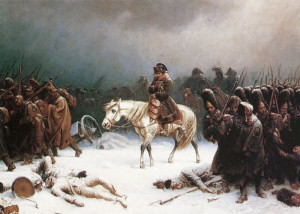Attrition
 Napoleon's Withdrawal From Russia
http://bit.ly/2f10lSu
Napoleon's Withdrawal From Russia
http://bit.ly/2f10lSu

http://bit.ly/2f10lSu
This week, more Clinton emails were discovered.
On the computer of former congressmen Anthony Weiner, under investigation by the FBI for sexting, a trove of previously unknown Clinton emails were uncovered. This was, for a time, kept quiet, until FBI director James Comey chose to send a letter to Congress informing them of the development. Within it seemed moments, people in and out of government, both left and right, were up in arms about this move.
The current and a former Attorney General both disavowed Comey’s decision as being partisan, and breaking a long precedent of government officials staying neutral in elections. Democrats, including Senate Majority Leader Harry Reid, roundly condemned his action, and Clinton herself said it was an illegal violation of the Hatch Act. Republicans were, predictably, jubilant at the news, although even some in their ranks thought this was in poor taste.
In summary: merely another day in the 2016 election. Though there is evidence suggesting that this news has swayed the opinions of some further against Clinton, for most people (myself included), this discovery is simply more white noise in the endless stream of scandals and debasement for both sides. It’s difficult at this point to be truly surprised, or indeed motivated to change opinions, by what has now essentially become business as usual.
In the bitter colds of Moscow, some 200 years ago, Napoleon and his army were, around this time of year, beginning their long retreat from Russia. They would along the way be torn apart by both the Russian guerrillas tracing their progress, and the merciless death of the cold itself. By the time they returned, only 20,000 of the 600,000 that departed were among them. It has since become one of the most infamous military defeats in history. What remains interesting to posterity however is that Napoleon lost not by a decisive battle like those that won him his fame, but by a slaughter of attrition.
Presidential races, like the battles of Napoleon’s time, were in the past won by strategy. By skilled manoeuvres of campaign schedules, political alliances, effective advertising, and above all, a good argument against your candidate. This race, though, has been determined not by strategy and wit, but by self-inflicted wounds.
Imagine a game of Jenga with two towers. Neither tower can affect the other directly, but as it is a game of survival, any damage to one benefits the other. Slowly you remove blocks from each – they wobble, but stay aloft. Then you remove another, and another, and soon you have a pair of structures teetering on collapse, shouting insults at one another, and trying desperately not to fall down. Each will claim they are beating the other, but in truth it’s not by their efforts that their opponent’s tower is collapsing, it’s by their own. Inevitably one of them will eventually succumb to the weight of their weaknesses and fall. The other will say they won, and that Jenga tower will become the new president.
I previously said the psychological impact of this election could be compared to the outbreak of World War 1, but the character of the election itself is a mirror of Napoleon’s failure in Russia, and of Vietnam: a kind of inverted, debasing war of attrition. There are no decisive battles to be won, no brilliant tactics to envelop the enemy, or secret backroom deals that seal victory. It is simply a test of who can survive the longest, a question not of their skill but of how well they can contain and construe the multitude of skeletons in their closets. Like two armies bombarding themselves rather than their enemy, waiting until only the other has completed their own destruction to say they won the battle.
It is, truly, a pity what this race has become.
